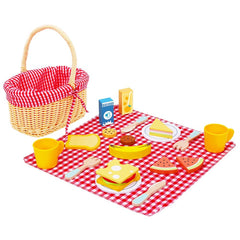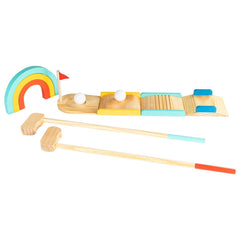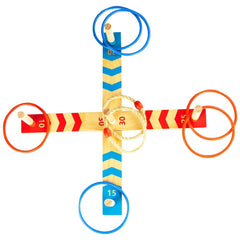For several compelling reasons, wooden toys, cherished for generations, continue to be a popular choice for child development. From body development to brain functioning, it is a crucial tool to develop various life skills in children.
Sparking Imagination and Curiosity
Wooden toys are ideal to promote learning through play. They promote sensory stimulation. Wooden toys often have a natural texture and warmth that engage a child's senses, promoting tactile exploration and sensory development. The feel of wood can be soothing and inviting for young children.
Without built-in sounds, lights, or animations, wooden toys encourage children to use their imagination to bring them to life. This kind of imaginative play nurtures creativity and cognitive development in children.
Benefits of Wooden Toys
Open-Ended Play: Wooden toys tend to be simple in design, allowing children to use their imagination and creativity in play. These toys don't have a predetermined function, encouraging children to invent their scenarios and stories.
Fine Motor Skills: Wooden toys typically have a solid and sturdy feel, requiring children to manipulate and grasp them. This manipulation helps develop fine motor skills, hand-eye coordination, and dexterity.
Imagination and Creativity: As wooden toys don't come with built-in sounds, lights, or animations, children are encouraged to use their imagination to bring the toys to life. This kind of imaginative play nurtures creativity and cognitive development.
Durability: Wooden toys are known for their durability and longevity. Over time, they can withstand rough play and maintain their integrity, making them excellent heirloom pieces to pass down through generations.
Environmental friendliness: wooden toys, often made from sustainably sourced materials, are biodegradable. Choosing wooden toys promotes eco-consciousness and helps reduce the environmental impact of the toys children interact with.
Cognitive Development: Wooden puzzles, blocks, and shape sorters contribute to cognitive development by enhancing problem-solving skills, spatial awareness, and logical thinking.
Language Development: Wooden toys can serve as conversation starters between children and carers. Playing with these toys can lead to conversations about shapes, colours, sizes, and more—supporting language development.
Less Overstimulation: In a world filled with electronic and noisy toys, wooden toys offer a quieter and more focused play experience. Such activities can help children develop concentration and attention span.
Social Interaction: Individuals or groups can enjoy wooden toys. When children engage with these toys together, they learn important social skills like sharing, cooperation, and communication.
Versatility: Wooden toys come in a wide variety of forms, from puzzles and building blocks to dolls and vehicles. This versatility allows parents and carers to choose toys that align with a child's interests and developmental stage.
Do wooden toys help boost social skills?
Individuals can enjoy wooden toys, but group play is optimal. When children engage with these toys together, they learn important social skills like sharing, cooperation, and communication. This process helps them become better adults and responsible, empathetic human beings.
Conclusion
Overall, wooden toys provide a holistic and well-rounded approach to child development. Their simplicity, durability, and focus on open-ended play make them an excellent choice for fostering various skills while encouraging a child's natural curiosity and creativity.
FAQs
1. What are the benefits of playing with wooden toys?
Wooden toys offer numerous advantages, ranging from enhancing motor skills to improving hand-eye coordination. Wooden toys like geometric shape sorters help in problem-solving and logical thinking. Toys like the Dollhouse Set and Mud Kitchen Set promote imaginative play. It fosters creativity and storytelling.
2. How do toys help with child development?
Ans: Toys help in child development by nurturing their imagination, boosting social and communication skills, and promoting balance and coordination abilities. By engaging children in various fun activities, toys help improve toddlers’ reaction time and promote the expression of ideas.
3. Why are wooden toys safe for children?
Ans: Wooden toys made of non-toxic materials are safe for children to play with. Biodegradable materials, unlike plastic toys, make wooden toys safe and eco-friendly. Additionally, wooden toys are more stable and durable for children's play. The design of these toys encourages toddlers to play with them.
4. Why do toys use wood?
Toys use wood because it is renewable and eco-friendly. Additionally, it fosters the development of both fine and gross motor skills in children. We can also design and colour it in a way that appeals to children. Wood’s tactile nature also provides sensory stimulation that enhances a child's development.





